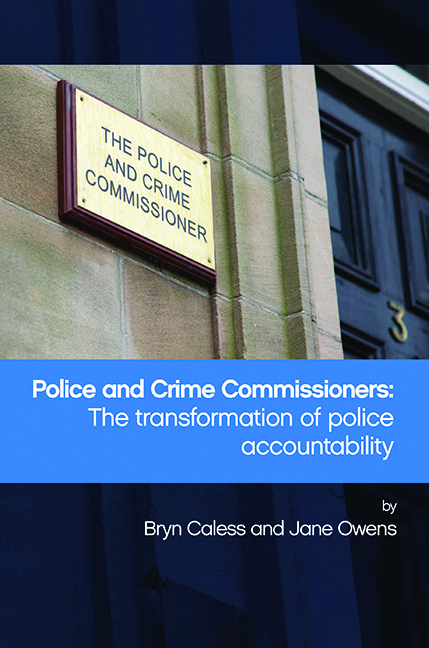Book contents
- Frontmatter
- Dedication
- Contents
- List of tables and figure
- Glossary of terms
- Acknowledgements
- Introduction
- one Governance: the Police and Crime Commissioner and police accountability in context
- two The psephology of the November 2012 election: motive, means and opportunity
- three Is the law on my side? Relationships between the PCC and the chief police officer team
- four Partners, colleagues or rivals for oversight? The (PCC) art of making friends and influencing people
- five “Putting yourself about”: PCCs, the media and the public
- six The debate with no end: PCCs’ remit and the problems of policing
- seven “I wonder if the game is worth the candle”: PCCs, their ‘work–life balance’ and their future
- General summary
- Bibliography
- Appendix Interview questionnaires
- Index
seven - “I wonder if the game is worth the candle”: PCCs, their ‘work–life balance’ and their future
Published online by Cambridge University Press: 01 September 2022
- Frontmatter
- Dedication
- Contents
- List of tables and figure
- Glossary of terms
- Acknowledgements
- Introduction
- one Governance: the Police and Crime Commissioner and police accountability in context
- two The psephology of the November 2012 election: motive, means and opportunity
- three Is the law on my side? Relationships between the PCC and the chief police officer team
- four Partners, colleagues or rivals for oversight? The (PCC) art of making friends and influencing people
- five “Putting yourself about”: PCCs, the media and the public
- six The debate with no end: PCCs’ remit and the problems of policing
- seven “I wonder if the game is worth the candle”: PCCs, their ‘work–life balance’ and their future
- General summary
- Bibliography
- Appendix Interview questionnaires
- Index
Summary
‘And I’ll tell you another thing: the hours we work are ludicrous. Sometimes when I’m driving myself home late at night after yet another meeting in the back of beyond, and knowing I’ve still got to be up early next day, I wonder if the game is worth the candle. This is an accident waiting to happen. […]’
Interviewer: Does the PCC role have a long-term future?
‘Dunno. Ask me when I grow up! Seriously, it might be too early to think about this, though some sort of role in the wider criminal justice system seems to beckon, once we’ve sorted out policing.’ (Interviewee 74)
Many PCCs and their chief officers have drawn our attention to the commissioners’ very heavy workloads, and we should consider, in the context of the literature on the subject, what the implications are of such workloads for the PCCs’ current and future effectiveness, health and wellbeing. At the same time, PCCs responded to our standard question about the future of the role, by speculating where they might expand or develop their remit. There is no doubt that most PCCs are energised by their role, engrossed in what they consider to be their duty and assiduous in their responses to invitations to meet ‘their’ public. That does not mean that they are blind to the drawbacks, as Interviewee 74 indicates above, which include late night travelling and very long working days. It may appear perverse, then, that they seek additional work and an expansion of what they do, if they are already stretched. As will become clear, many see additions or extensions to the role as logical next steps, predicated on the assumption that they will have “sorted out policing” beforehand. This final chapter explores the PCCs’ current work–life balance (or lack of it) and their often rueful commentary on their work, together with their views of where the role might go in the future. We seek to contextualise both elements in wider academic research and analysis.
- Type
- Chapter
- Information
- Police and Crime CommissionersThe Transformation of Police Accountability, pp. 183 - 208Publisher: Bristol University PressPrint publication year: 2016



